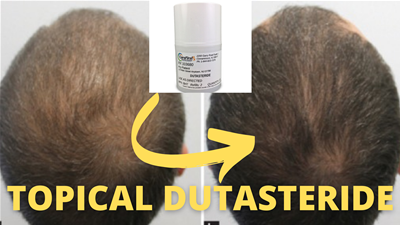Dutasteride is known as the 'holy grail' of hair loss treatments. Unfortunately, it is not approved by the FDA as a hair loss medication. However, it's prescribed off-label by many hair restoration physicians, and it has shown to be even more effective than finasteride, according to studies. The problem isn't dutasteride's efficacy. The problem is the potential for side effects. But what if we could bypass the side effects and still get similar efficacy? Keep reading.
What is Dutasteride?
Avodart is the brand name for dutasteride. Dutasteride is a 5-alpha reductase inhibitor. The 5-alpha reductase enzyme is responsible for converting testosterone into DHT. DHT is the hormone responsible for triggering male and female pattern hair loss.
Finasteride is also a 5-alpha reductase inhibitor. However, dutasteride is a dual 5-alpha reductase inhibitor. This means dutasteride inhibits both DHT levels in the body and on the scalp. In one study, 416 men ages 21-45 were randomized to receive dutasteride, finasteride, and a placebo for 24 weeks. The outcome of the study showed that dutasteride was superior to finasteride from months 12-24.
Dutasteride and Mesotherapy Study
To date, there has only been one study performed to test the efficacy of topical dutasteride. The sample size was small, with five men and one woman participating in the study. The participants received 1ml of intradermal dutasteride 0.01% and mesotherapy. Researchers assessed the results after nine months of the initial injection.
Also, laboratory tests for the participant's hormonal profiles were done before and after the research. Total and free testosterone, 5-alpha DHT, and 3-alpha androstenediol were reviewed before and after the injections were done. The results showed no significant statistical difference in the participant's hormones, including DHT. Dutasteride can inhibit 90% of DHT serum in the body, so this is pretty significant.
At the end of the study, all participants showed marked improvements in their genetic hair loss. Every participant saw an increase in hair density and hair diameter per the trichoscopy. No adverse reactions were reported during the study, and follow-up laboratory tests showed no difference in hormone serum before or after the treatment.
So Will Topical Dutasteride Work?
Unfortunately, the jury is still out. The only study we have is tiny, with only six participants. Although it sounds promising, there isn't enough conclusive evidence. Please note that the study was for intramuscular injections and not dutasteride applied topically. That said, there are some highly credible and reputable hair transplant surgeons compounding topical dutasteride for their patients. The idea behind topical dutasteride is intriguing, and the hair loss industry doesn't have many glimmers of hope. We can only hope that the topical version will be half as effective as the oral version.
Conclusion
We're still waiting for more information to develop regarding topical dutasteride. We will be reaching out to the world's elite hair transplant surgeons to find out more information. If you have any questions regarding topical solutions, hair loss treatments, or want to inquire about hair transplant surgery. Follow this link here to submit free virtual consultations to physicians in your area and receive this information via email.

